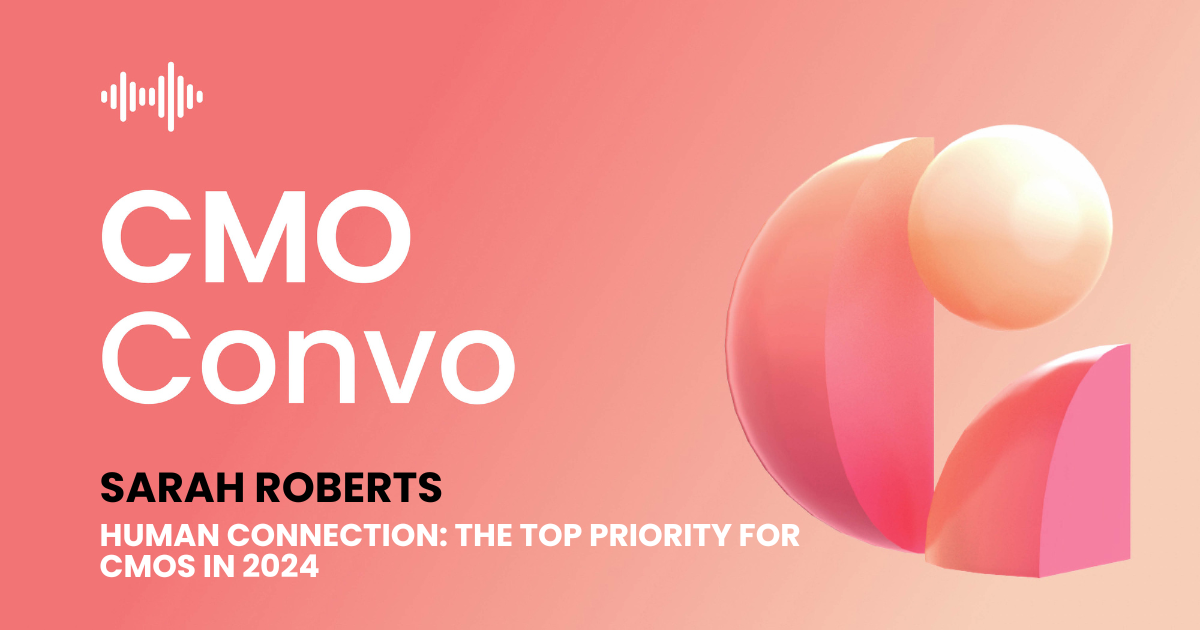This article is based on insights from Lori's appearance on the CMO Convo podcast.
Steering through the ever-evolving landscape of marketing in 2024 is both a challenge and an opportunity for those of us at the helm.
As the industry stands at a significant crossroads, marked by the end of third-party cookies and a greater emphasis on values-driven marketing, my role as a CMO has transcended traditional boundaries. It involves understanding the multifaceted impacts of global events on our teams and customers alike, while pioneering innovative strategies for a rapidly changing world.
In our discussion, Lori Goode, CMO of Index Exchange, shared insights on how we, as marketers, can forge a path forward in this new era, balancing technology, values, and the undeniable importance of the human connection. In this article, you'll find the biggest insights on how CMOs can thrive in 2024.
NB: Responses edited for clarity and length.

The emergence and impact of AI in marketing
My perspective on AI's role in marketing is multifaceted and evolving. We are undoubtedly in the early stages of leveraging AI's full potential. 2023 was pivotal in redefining our understanding and usage of AI. Historically, AI has been a constant in the technological narrative, integral to digital platforms like Google, and at Index Exchange, we've integrated AI extensively in our technology.
The rise of tools like ChatGPT has shifted AI into a more consumer-focused realm, making it a household name and even finding its place in educational settings. The question now is how to best use generative AI in practical, meaningful ways, especially in marketing.
In our team, we're exploring AI's utility in enhancing efficiency. AI is exceptionally useful for routine tasks that require less intellectual engagement but are critical for capturing oversights or summarizing content. This application of AI frees up time for more strategic thinking.
On the creative front, there's still much to learn. Establishing best practices is essential for effective and responsible AI use. We must consider privacy safeguards and the sustainability of AI, especially given its increasing demand on computing power.
The rapid ascent of AI in our industry has left us scrambling to understand its long-term implications. We're keenly focused on maintaining the authenticity and human touch in content creation while leveraging AI's benefits. The journey with AI in marketing is just beginning, and it's a balancing act of harnessing its power responsibly and efficiently.

Navigating ethical AI usage and its impact on marketing in 2024
Looking ahead to 2024, I foresee a continuous race between the adoption and application of AI and the development of relevant regulations. Historical examples show that technology often outpaces regulation and understanding of its implications. This scenario is likely to repeat with AI, where its consumption and novel applications may advance faster than the establishment of responsible usage guidelines.
Reflecting on my time at Facebook, I remember Mark Zuckerberg discussing how, during Facebook's inception, he didn't fully grasp the long-term implications of the platform. This is a common challenge: envisioning the future impact of emerging technologies is difficult. However, given our past experiences, we have the opportunity to approach AI with more awareness and caution.
Collaboration and transparency are key. By openly sharing how we're applying AI, its successes and pitfalls, we can collectively learn and potentially stay ahead of regulatory needs and misuse. This requires speed and openness in how we use AI tools.
In terms of roles evolving with AI, the emergence of positions like 'prompt engineers' shows the need for expertise in leveraging AI tools like ChatGPT effectively. It's fascinating to witness this development and the innovation it sparks. For instance, Coca-Cola's recent AI-generated creative campaign showcased the imaginative possibilities of AI in marketing.
Another crucial aspect is the impact of AI on journalism. As a company dedicated to supporting the open internet, we think deeply about how AI might affect journalism and content quality. The rise of AI-generated content, if unchecked, could challenge the standards of good journalism.
This brings to the fore the importance of reinforcing high-quality journalism and content, ensuring that such publications continue to thrive amid the AI wave. The balance between embracing AI's innovative capabilities and maintaining the integrity and quality of human-created content will be a defining challenge for marketers and content creators in 2024.
AI and the evolution of internet search and marketing
The future of AI-enabled search holds the promise of diversifying internet content and enhancing access to a variety of information. Traditionally, SEO has dominated content creation, driven by the enigmatic Google algorithm, leading to a somewhat homogenized internet where content and metadata are structured similarly to appease search engines.
However, AI's potential to respond directly to specific queries could deepen the connection between a user's question and the search results, moving beyond traditional SEO constraints.
An important aspect to consider is the risk of search engines providing all answers within themselves, potentially bypassing the richer, deeper content on actual websites. This is a challenge for marketers and content creators who strive to draw audiences to their original, in-depth content.
The evolution of search engines could impact how users interact with content, making it crucial for marketers to stay abreast of these changes.
In marketing, the only constant is indeed change. Marketers must continually adapt, predict upcoming trends, and test new strategies to align with evolving technologies and user behaviors. It’s vital to gather as much information as possible to ensure that marketing strategies evolve alongside these technological advancements.
Reflecting on the historical evolution of marketing, from radio ads to television and now AI, it's evident that marketing evolves with society. AI, especially generative AI, has democratized access to advanced technologies. It has moved from being a complex component hidden within tech stacks, accessible only to a select few, to a more universally accessible tool.
This democratization of AI is a significant shift, making it a more integral part of everyday internet usage and marketing strategies. The challenge for marketers now is to navigate this new landscape where AI is no longer a distant, complex tool, but a readily accessible resource that is reshaping how we interact with digital content and marketing.
Achieving more with less: A dual approach
In 2023, the concept of "doing more with less" made some marketers more risk-averse. However, my experience at Index Exchange illustrates how careful experimentation, even with limited resources, can lead to successful outcomes.
Our initiative 'Index Explains' is a prime example. We had a very modest budget, almost reminiscent of MacGyver's resourcefulness, using paper clips and bubblegum metaphorically to piece things together. The team invested countless hours in learning new skills, such as proper lighting techniques, filming with personal cameras, and post-production editing. This required reallocating their responsibilities, sacrificing some tasks to focus on this new project.
The journey wasn't just about creating content; it was about personal and professional growth for the team. They were deeply invested in making this project successful. By the mid-year review, the success of 'Index Explains' was evident. It became a valuable resource, even used in other companies' onboarding processes. This success made it easier to present a business case for further investment.
I understand that not all stories are success stories, but the approach we took can be instructive. Start with a small, incremental budget, set clear objectives, and be prepared to negotiate. It's about making sacrifices in the short term to build a case for future investment.
Ensuring alignment with your CFO, commercial stakeholders, and CEO is crucial to make this work. This approach allows for experimentation within the constraints of a limited budget, balancing risk with potential reward.
In the context of the short tenure of CMOs and the pressure to deliver results, this strategy of calculated risk-taking and continuous learning can be a viable path forward. It's about setting the right expectations, being agile, and being open to learning and adapting along the way. This is how we can continue to innovate and push boundaries in marketing, even in times of economic restraint.
Embracing change and strategic focus in marketing
The concept of "doing more with less" or "doing less better" in marketing is not just about reducing activities but about refining our focus and understanding the true impact of our actions.
It's crucial to recognize that turning off certain functions or activities can be an effective way to assess their real value. If discontinuing an activity doesn't impact revenue or other key metrics significantly, it might indicate that our resources and efforts are better directed elsewhere. This approach requires well-thought-out plans with buy-in from other stakeholders, acknowledging and preparing for the risks involved.
The relationship with other C-suite members has always been vital for CMOs, but its importance increases with each passing year. As the role of marketing and its challenges evolve, having a deep alliance within the C-suite is essential. This doesn't mean agreeing on everything, but it does mean working towards a common goal and clearly understanding each department's impact on this goal.
At Index Exchange, my approach has always been to make judicious decisions based on data and to be creative with resource allocation. This creativity has been crucial, especially in larger companies where budgets weren't always abundant.
Being able to turn on and off programs based on their effectiveness is a key part of this strategy. It's important not to be too attached to any single program. If turning off a program doesn't elicit any significant response or impact, it may not be as valuable as we thought.
The shift in mindset from growth at all costs to more nuanced, clear goals is refreshing. Growth is now more straightforwardly linked to revenue, rather than the myriad interpretations it used to have. This clarity helps CMOs better understand their role and expectations within the business.
Responsible, long-term growth has been the antithesis of the “growth at all costs” mentality for us at Index Exchange. Our willingness to make short-term sacrifices for long-term benefits has been key to our success and longevity, especially in a rapidly changing industry. Being independent and adaptable for over 20 years is a testament to our approach to growth, one that isn’t driven by external pressures but by a strategic focus on what truly matters for sustainable success.
Addressing macroeconomic challenges and employee well-being
In response to the macroeconomic challenges, our approach at Index Exchange has been sensitive and pragmatic, especially considering the impact on traditional publishers and media owners.
As a global company, we understand that these challenges vary significantly across regions. Our primary focus is on driving revenue for media owners, leveraging partnerships within the ecosystem, like demand-side platforms. Programmatic advertising offers the flexibility to adjust ad spends quickly, which is crucial in fluctuating economic conditions. We continually strive to make our technology more efficient, thereby reducing our take rate and directing more working media spend to media owners.
In terms of broader global issues, it's essential to view these through a human lens rather than a political one. At the core, marketing is about reaching and connecting with people - whether they're employees, customers, or the broader industry. This human-centric approach requires empathy and an understanding of the varied impacts these issues have.
As marketers, our sensitivity to these needs shapes our focus and guides our strategy in doing less but better. Regarding the emotional and physical well-being of our team, we take this very seriously.
Supporting each other is a core value at Index Exchange, deeply ingrained in our leadership and company ethos. We've implemented policies and programs that prioritize our team's mental and physical health. These include robust insurance plans, a Mental Health First Aiders program, expanded time-off policies encompassing mental health, and active affinity and D&I groups.
As a leader, I believe in leading with transparency and authenticity, creating an environment where team members can be open and bring their whole selves to work. We encourage open communication with managers and maintain an open-door policy for those who need it.
Recognizing that we often don't see the full extent of what someone is going through, we promote empathy and understanding. We empower our team to take the time they need and have created a culture where colleagues are ready to support each other. This openness and willingness to help one another is vital in navigating the challenges we face, both individually and as an organization.
Navigating political and social challenges as a leader
As we head into 2024, with its impending elections in the US and potentially the UK, there's a heightened sense of responsibility towards my team. The past few years have been filled with unpredictable and often tragic events, which have significantly impacted people's lives. This has prepared me to expect the unexpected and to be ready for anything. It's crucial to acknowledge these events, no matter where one stands politically, as they affect our employees, customers, and the broader community.
My approach is to brace for the complexities of another political year while maintaining a strong support system within our executive team. We meet daily to discuss how to respond to various situations, how to support our employees, and how to be aware of and sensitive to those particularly impacted by ongoing events. The key is to ask, "How can we support our employees both individually and collectively?"
The upcoming year will undoubtedly not be easy. We must be prepared for this and prioritize openness, empathy, and understanding. Granting space for people to think, grieve, and react is essential. We must be mindful that not everyone will have the same perspective on these events. As a global company with a diverse workforce, different viewpoints are inevitable and valuable. They contribute to our uniqueness and success.
However, this diversity also means managing a range of opinions and experiences respectfully. It's about creating an environment where differing viewpoints are acknowledged and respected.
As we navigate through these challenges, the focus will be on maintaining a respectful and supportive atmosphere for all our employees, acknowledging that each person's experience and reaction to global events can vary widely. This approach will be crucial for navigating whatever 2024 brings, ensuring that we continue to support and understand our team members through these unpredictable times.
The rise of purpose and value-driven marketing
The trend towards purpose or values-driven marketing, which gained significant traction in 2023, is not something I see diminishing anytime soon. This movement reflects the accountability consumers now expect from brands, where their spending power is increasingly aligned with their values. Issues like sustainability, diversity, equity, inclusion, belonging, and representation have become more critical and will continue to grow in importance.
The question of how public a company should be in actively supporting specific issues is complex. However, at its core, companies that ignore these fundamental human concerns risk being left behind. This isn't just about appearing socially conscious; it's fundamentally linked to business growth. It's become clear that not engaging with these issues is no longer an option.
Consider the financial aspect: studies like Kantar's indicate a massive spending power in underrepresented groups, amounting to trillions of dollars. Brands that fail to include and represent these groups in their marketing strategies are missing out on significant revenue opportunities.
This realization is now reaching CFOs who may have previously viewed sustainability or diversity initiatives as peripheral concerns. These issues are now central to business strategies.
From a business-to-business perspective, the pressure is mounting as well. Brands are increasingly scrutinized by their consumers, and this scrutiny extends to their suppliers. RFPs now commonly include queries about sustainability practices and diversity and inclusion metrics. This trickle-down effect of consumer pressure is driving substantive change.
I'm particularly excited about the role of consumers, especially Gen Z, in leading this change. Their insistence on aligning with brands that share their values is not just a trend but a shift in the market dynamic. These younger consumers are the vanguard of future spending habits, and their influence is prompting businesses to align their growth strategies with societal issues.
Looking ahead to 2024, I anticipate we'll see more companies publicly accounting for their efforts in diversity and inclusion, as well as sustainability, both in the workplace and the marketplace. This alignment of business growth with societal values is not just overdue; it's essential for the future of business. It represents a significant and positive shift in how companies operate and how they are perceived by their increasingly conscientious consumer base.

Preparing for the end of third-party cookies
As we anticipate the end of third-party cookies, a major shift for the marketing industry, we at Index Exchange are proactively investing in developing solutions. When Google first announced the phase-out of third-party cookies, we began exploring interoperability with various types of identifiers.
It's clear that there isn't a one-size-fits-all solution, especially as it varies based on whether a marketer has access to first-party data. Solutions like contextual targeting, which had waned in popularity, are now resurfacing as viable alternatives.
A significant development this year, tied to Google's announcement, is the Google Privacy Sandbox. We've invested considerable resources into understanding and testing this new framework. A few months ago, we went a step further by creating a separate exchange environment to simulate and test the impacts from all angles - SSP, DSP, and the publisher side.
This initiative is part of our commitment to staying ahead of the curve in this evolving landscape.
We're also focusing on educating our partners and the industry about these changes. Our educational series, 'Index Explains,' now includes topics specific to Google Privacy Sandbox because of its complexity and the need for widespread understanding. The shift from third-party cookies to browser-based functionality is significant, and there's still much to learn about how this will play out.
It's crucial for everyone in the ecosystem to engage in testing the Google Privacy Sandbox to ensure continuity in functionality and outcomes that marketers rely on. Alongside these efforts, we continue to explore other solutions like alternative identifiers and contextual targeting.
The end of third-party cookies marks a substantial change in digital marketing, but it also opens the door for innovation and new strategies that align with evolving privacy standards and consumer expectations. Preparing for this shift is not just about adapting to a new technological landscape; it's about embracing an opportunity to redefine how we engage with audiences in a more privacy-conscious world.
Emphasizing humanity in leadership for 2024
As we look towards the challenges and opportunities of 2024, my key piece of advice for CMOs and marketing leaders is to prioritize humanity in all aspects of their role. This encompasses not just the strategies and tactics we employ but also how we lead our teams and engage with our customers.
The changing landscape, especially with the end of third-party cookies, highlights the increasing awareness and value of consumer data. This shift demands a fair exchange between companies and consumers, underscoring the need for businesses to demonstrate the value they place on data protection and privacy. It's a balancing act between ensuring consumer data protection, maintaining a beneficial experience for marketers and brands, and preserving a positive consumer experience.
As we navigate through the early testing phases of solutions like Google's Privacy Sandbox, it's important to remember the core of our efforts is to protect consumer privacy while still delivering valuable marketing outcomes. The imminent end of third-party cookies in Chrome, already a reality in other browsers, emphasizes the need for innovative privacy solutions in this new era.
As marketing leaders, our focus should be on the human elements of our work. This means being open, transparent, and understanding with our teams, acknowledging the broader world around us that impacts everyone's daily lives. It's about seeing our customers not just as data points but as individuals with unique needs and concerns.
The upcoming year might be unpredictable and challenging, but by keeping humanity at the forefront of our leadership approach, we can navigate these challenges more effectively. Our actions and decisions should be thoughtful and intentional, always considering the human impact they have not only within our organizations but also in the broader industry and society. This human-centric approach will be vital for leading successfully through the uncertainties and complexities of 2024.

Anticipating exciting developments in 2024
Heading into 2024, there's a lot that excites me. Despite discussing some challenging topics, the future holds many promising opportunities, especially at Index Exchange.
One of the things I'm most enthusiastic about is the launch of new products next year. These products are not just exciting developments for us but have the potential to significantly impact our partners and the industry. We're planning to announce these early next year, and I believe they will mark a positive and transformative change for Index Exchange.
Beyond the products and strategies, what truly energizes me is my team. I am incredibly proud and inspired by the group I work with. Their dedication, creativity, and collaborative spirit are sources of great joy and optimism for me. As we go through the processes of budget planning and strategizing, their contributions and insights invigorate me and make me look forward to what lies ahead.
I believe 2024 will be a year of growth and development for us. Watching my team evolve, taking on new challenges, and continuing to deliver exceptional value to our customers is something I am eagerly anticipating. It's the combination of innovative products and an outstanding team that makes the future so promising at Index Exchange, and I can't wait to see what we achieve together in the coming year.
2024 is filled with both opportunities and challenges for CMOs. Get the support you need to navigate them with a global network of marketing leaders: the CMO Alliance Community Slack channel.




 Follow us on LinkedIn
Follow us on LinkedIn




